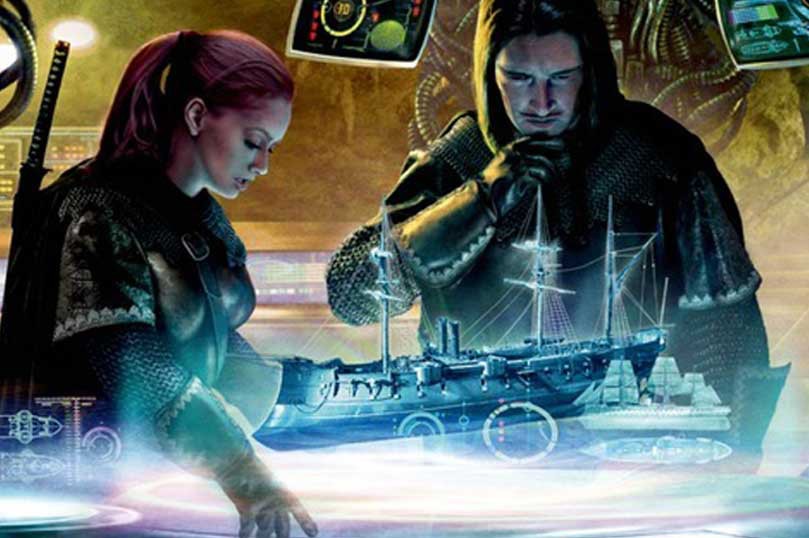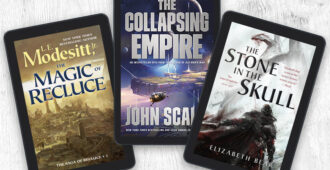Welcome to Throwback Thursdays on the Tor/Forge blog! Every other week, we’re delving into our newsletter archives and sharing some of our favorite posts.
Like a Mighty Army, the seventh book in David Weber’s Safehold series, published this week! To celebrate, we’re looking back to the publication of the first book, Off Armageddon Reef. David Weber answered questions in the January 2008 Tor Newsletter about the launch of his new series. We hope you enjoy this blast from the past, and be sure to check back every other Thursday for more!
 Religion vs. innovation and technology is a significant theme in Off Armageddon Reef. Why did you decide to use this potentially incendiary topic? How do you equate it to what’s happening in our world today?
Religion vs. innovation and technology is a significant theme in Off Armageddon Reef. Why did you decide to use this potentially incendiary topic? How do you equate it to what’s happening in our world today?
If you take a look at the main body of my writing, you’ll see that religion and personal decision-making and choices have always been major elements of my stories. My own religious beliefs are strong, and I think that may make me more comfortable using religious elements—negative and positive alike—in my writing. It’s obvious that I see technology as a liberating force, although (like religion) there’s always a Darth Vader dark side waiting for the unwary. Perhaps because of that, I don’t see the question of religion versus innovation and technology as particularly incendiary. The conflict between innovation and religion, I believe, results primarily from collisions between innovation and exclusionary religion. That doesn’t mean there aren’t legitimate religious and moral concerns where specific areas of innovation or types of research are concerned. What’s happening on Safehold in the novels reflects the conflict between zealotry and faith-based reason. Between an ideology (in this case, a religious one) which enshrines control and authoritarianism; the renunciation of personal responsibility to think, judge, and make informed choices and live with the consequences. I think that in an era of “postmodernism” and relativism, human beings—including, perhaps, my readers–sense the need, like Archimedes, for a place to stand, a moral basis of inviolable core principles, if they truly hope to move the world.
Off Armageddon Reef is the launch of an epic new series. Can readers new to your work enjoy it as a stand-alone novel? How does Off Armageddon Reef relate to your other novels, including your wildly popular Honor Harrington series?
I think that Off Armageddon Reef can be quite satisfying read as a stand-alone novel, although, obviously, I think it will be even more satisfying as one element in an ongoing series. Readers of my other novels, like the Honor Harrington books, are going to find some familiar themes and story elements. I don’t know that anyone can produce the number of books that I’ve produced without having familiar elements surface in different guises. I believe that the strongest attraction for the majority of my readers is that my protagonists are decision makers, choice makers, and responsibility takers. They are the sort of people all of us, I think, both want to see in our leaders and would like to be on a personal level. And I think some readers probably see characters like Honor or Nimue and the choices they make as a sort of escape from—or an antidote for, perhaps—the cynicism which envelops so much of our own society at this particular historical juncture.
It’s been said that you challenge current gender roles in your novels. This is certainly true in Off Armageddon Reef. What are your reasons for returning to this theme?
I think I’m probably attracted to “challenging current gender roles” because of all of the strong women I’ve known in my life, beginning with my mother and certainly including my wife, Sharon. I never set out to challenge any gender roles as a deliberate marketing point. I happen to prefer strong, competent people who are willing to take chances for the things they believe in (even when they’re not necessarily the things I might believe in), regardless of whether they’re male or female. I do take a certain pleasure in juxtaposing “traditional” roles and duties, but if you really look at most of my science fiction—Off Armageddon Reef is something of an exception in this respect, although that begins changing in the second and subsequent volumes of the series—you’ll see that it’s not so much a case of challenging gender roles as it is of simply ignoring them.
I’ve always had a problem with far-future science fiction in which current gender roles or social disputes are presented without change from our present-day ideological battlefields. If you’re going to build a far-distant literary future, then you have to explain to the reader why nothing has changed in the last several centuries of your future society’s historical experience. As I’ve said at more than one science fiction convention, my view is that if we’re on the right track where gender equality is concerned (and I think we are) by the time of someone like Honor Harrington—or Nimue Alban—it’s going to be a done deal. And it’s also going to be a purely historical issue for mainstream societies, about on a par with our own concern over Pharaoh’s foreign policy towards the Hittites. So that’s the way I structured Honor Harrington’s society, and Nimue Alban’s birth society. And if you do that, then almost by definition you appear to be “challenging” gender roles in that you’ve pretty much eliminated them entirely from consideration whether “challenging” them was what you set out to do in the first place or not.
Technological advancement poses grave danger in Off Armageddon Reef. Could this storyline be compared to the target our technologically advanced country has become today?
With one glaring exception, I certainly didn’t set out to draw a deliberate parallel between our own country’s technological advancement and the dangers—internal and/external—it faces. As I said above, I have strong religious beliefs of my own, but as I’ve pointed out in my books, no one has a monopoly on fanaticism, and that’s the one parallel I’ve deliberately and consciously set out to draw. Organized religion, and its opponents, have a long history of producing fanatics. In fact, it’s probably fair to say that up until the last few centuries religion produced more fanatics than anything else. In the Western experience, particularly, I think that political and economic ideologies have had a tendency to displace religious fanaticism to a large degree, although some people seem to feel that a religious basis is necessary for true fanaticism to exist. I think we forget the power of fanaticism at our own risk. In fact, up until the last few years, we had pretty much forgotten the power of fanaticism…and have yet to discover the full cost of that forgetfulness. The collision of human belief structures is the greatest underlying cause for human conflict, and there are, unfortunately, times when, with the best intentions in the world, it’s impossible to coexist peaceably with someone else’s belief structure. For coexistence to be possible, both sides have to believe that it’s not only possible, but desirable, and that, alas, is not always the case.
At this particular time, the United States is the poster child for a technological-industrial society. The basic social blueprint for the US, ideologically speaking, is based on the values of Western humanism, which have been hugely influenced by Judeo-Christian religious teachings. Those humanist values, with their emphasis on the individual and on freedom of conscience, are anathema to those who fear secularization. When you combine that fear of secularization with the wealth, power, and fervent faith in technology and science which are so much a part of the United States’ image today, it’s inevitable that we should become the “Great Satan.” If I were a practitioner of conservative Islam today, I know that I would be horrified by what I saw bearing down on my religion and my society from the United States and Europe. And I would also be aware that the West’s economic and industrial success would be dreadfully seductive to those who do not enjoy an equal level of success, and that the possibility of similar secular success must inevitably fragment the cohesiveness of my own theocratic view of how the world is supposed to be organized to the glory of God.
Right there, I believe, you have the core causes for what’s happening in the world today and the reason that so many on both sides believe that true coexistence simply isn’t possible. Which, in a somewhat roundabout way, brings me back to the situation I’ve created on Safehold. I don’t propose to turn this series into a polemical argument about what we ought to be doing in our own specific, actual situation. Obviously, the options and alternatives for my fictional characters are going to be quite different from the constraints we face in the actual world. But the mindsets which create the constraints we face are something I want to examine, turn around, maybe even “illuminate” (to use the artsy term) in the process of writing what I hope will be an enjoyable action story.
This article is originally from the January 2008 Tor/Forge newsletter. Sign up for the Tor/Forge newsletter now, and get similar content in your inbox twice a month!







Comments are closed.
Leave a Reply